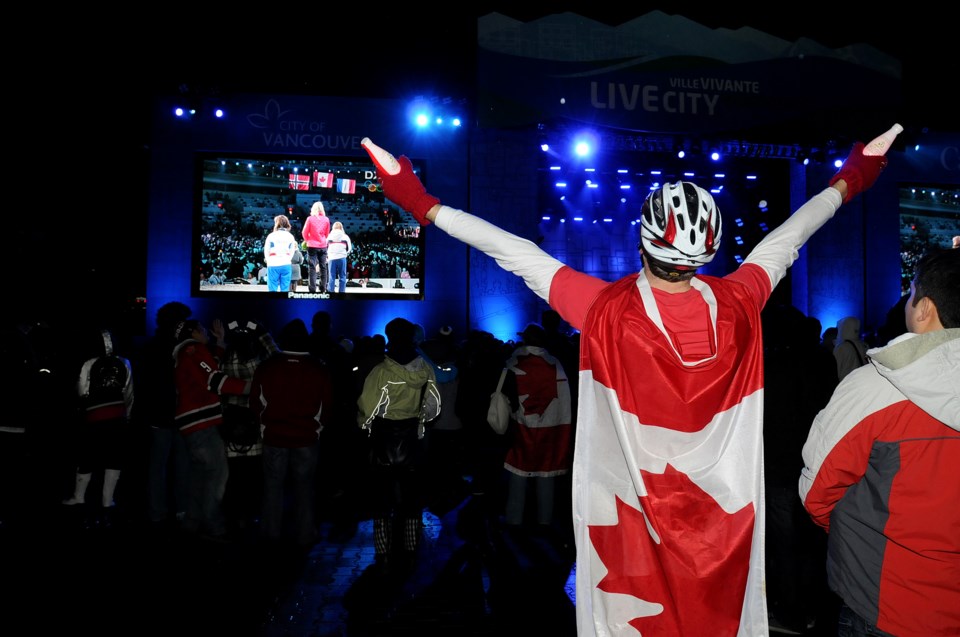Exactly a decade after the Olympic torch finally arrived in Vancouver for the 2010 Olympic and Paralympic Games, it is fair to ask what Canadians got in return for our multi-billion-dollar investment, and to consider who won and who lost.
In the weeks immediately after the athletes all went home to their respective countries, there were some who believed Vancouver had pulled off a miracle. On the face of it, the event had become a spectacular success. However, the Games got off to a deadly start, when a fatal accident in Whistler took the life of Georgian luge athlete Nodar Kumaritashvili.
The death, which happened during a training run just hours before the opening ceremony at BC Place stadium, had the potential to cast a pall over the 2010 Olympics. Then, only two days later, Quebec skier Alexandre Bilodeau made sports history when he became the first Canadian to win a gold medal at an Olympics held in Canada.
Hearing O Canada ring out at the medal ceremony for Bilodeau’s men’s moguls win was one of the early turning points of the Games that prevented it from becoming a costly public relations bust.
The late Jack Poole, who spirited along the enormous Games effort as chair of the Vancouver Olympics organizing committee (VANOC) until his untimely death from pancreatic cancer, described the whole endeavour as a “pressure cooker.”
The weight of the world sat on Poole’s shoulders, as much as it did VANOC’s president and COO John Furlong, and then-B.C. Premier Gordon Campbell. Together, all three men risked the huge public investment, their personal and professional reputations, and the reputation of our city and country if the Games was not a success.
This week’s Wet'suwet'en solidarity protests in Vancouver, and across the province, are an echo of the comparatively loud and angry demonstrations that gripped the city for months leading up to the 2010 Games. The chants of “Homes, not Games” and “No Olympics on stolen native land” rang out, but ultimately did not sway public opinion.
Some blamed VANOC’s clumsy, top-down management style for the rift with social activists. While it is true Furlong often looked like a deer in the headlights when met with angry disruptions at Vancouver city hall and elsewhere, no one can fault his efforts to be inclusive of First Nations.
In fact, VANOC’s partnership with the four host First Nations — the Lil'wat, Musqueam, Squamish and Tsleil-Waututh — were a significant part of the Games’ success. Canada’s aboriginal cultures were featured at several popular pavilions in downtown Vancouver as well.
Thanks to the powerful Own the Podium program, Canada impressed the world by winning medal after medal, coming in third place overall behind the U.S.A. and Germany, but topping the standings for the number of gold medals including the pivotal men’s hockey game.
And while the Olympic events captivated the world, something significant began to happen on the streets and in the surrounding boroughs of Vancouver. The general public — many who could never afford to attend an Olympic competition — made Vancouver’s Games their own.
Thanks to dozens of free or low-cost attractions and activities, citizens ignored the recommendation of city officials to stay at home. Instead, downtown Vancouver teemed with more than 100,000 visitors on a daily basis, impressing veteran Games organizers and global media.
As luck would have it a humble online guide for those free venues — prepared by me and longtime collaborator Daniel Fontaine — attracted millions of views online, and gave tens of thousands on a low budget the ability to join in the celebration.
Some have asserted that Vancouver’s 2010 Games — the most expensive peacetime event in our nation’s history — was a defining moment for Canada, both in terms of our national psyche but in the eyes of the world.
But what do we have left from our 2010 experience besides new roads, buildings and the Canada Line?
While our region attracts much more tourism and business investment today, we also have watched our real estate prices skyrocket and putting home ownership out of reach for many.
And the men who led the charge — Campbell and Furlong — both have retreated from the limelight.
Did Vancouver and Canada come out ahead? For me the answer is yes, but the debate on this question is sure to continue.
***
Listen to the Vancouver Overcast podcast for Mike Klassen’s 2010 Games retrospective with reporter Bob Mackin below:
mike@mikeklassen.net



